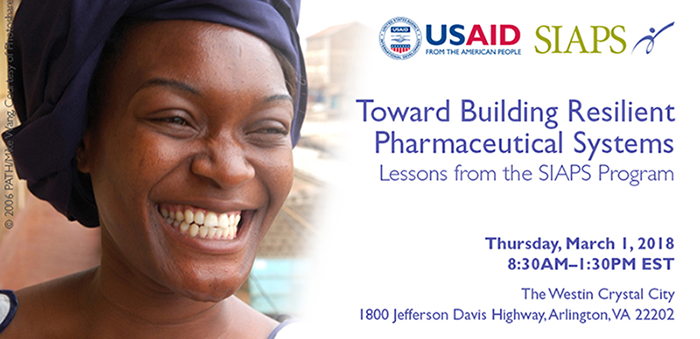Management Sciences for Health to Share Six Years of Pharmaceutical Systems Strengthening Experience in 46 Countries at Event in Arlington, VA
Management Sciences for Health to Share Six Years of Pharmaceutical Systems Strengthening Experience in 46 Countries at Event in Arlington, VA

Arlington, VA—February 20, 2018—On Thursday, March 1, 2018, Management Sciences for Health (MSH) will host an end-of-program event for the USAID-funded Systems for Improved Access to Pharmaceuticals and Services (SIAPS) program. The event, under the theme, Toward Building Resilient Pharmaceutical Systems, will address progress made and opportunities toward ensuring that quality, life-saving essential medicines and services are available and affordable for the world’s poorest and most vulnerable.
SIAPS was implemented by Management Sciences for Health (MSH) together with 11 core and resource partner organizations. It worked in 46 countries, with field offices in 22 countries, from 2011 to 2018. The program aimed to strengthen pharmaceutical systems by focusing on results in five interrelated areas—strengthening governance, building human resource capacity, addressing information needs, improving financing strategy, and ensuring effective service delivery—to ultimately address disease-specific and country needs.
“The SIAPS approach and results are a testimony to the effectiveness of the systems strengthening approach for global health that USAID envisioned more than two decades ago. However, to be fully sustainable, this work is on a continuum. Future progress needs to build upon prior work and experiences. We will be gathering March 1 to showcase our results and discuss how the global health community can continue to help ensure access to and appropriate use of safe, quality medicines—which is critical to our goals for universal health care,” said Francis Aboagye-Nyame, SIAPS program director.
The SIAPS approach focused on building and/or strengthening systems that ensured equitable access to and appropriate use of effective pharmaceutical technologies and medicines for the diagnosis and treatment of major public health diseases, including malaria; HIV/AIDS; family planning; maternal, newborn, and child health; tuberculosis; neglected tropical diseases; and, more recently, Ebola. By helping countries meet disease-specific targets, the SIAPS implementation strategy strengthened pharmaceutical systems to provide a wider range of medicines and pharmaceutical products, ensure that they are appropriately used, assure patient safety; ultimately producing improved health outcomes. Work done between 2011 and 2018 solidified important technical concepts and advanced and consolidated systems strengthening work, with many countries achieving important milestones.
Event Program
Among other activities, a panel discussion will explore opportunities and challenges for the future of pharmaceutical systems strengthening and advance a vision of what it takes to build resilient pharmaceutical systems that promote good health outcomes. Attendees can visit the SIAPS Solutions Marketplace, a series of short presentations, to learn about the approaches, strategies, tools, and actions that SIAPS developed to improve access to and use of pharmaceutical products and services.
The event will feature remarks from Kelly Saldana, director of the Office of Health Systems, USAID; Marian Wentworth, president and CEO of Management Sciences for Health; Douglas Keene, Vice President, MSH Pharmaceuticals and Health Technologies Group; and Francis Aboagye-Nyame, SIAPS program director. It will be held at the Westin Crystal City in Arlington, Virginia from 8:30 a.m. to 1:30 p.m. It is free to the public. Registration is available at www.eventbrite.com.
SIAPS Partners
To achieve the program’s goals, SIAPS collaborated with a consortium of core and specialized resource partners who brought a wide-ranging mix of skills and expertise to the program. SIAPS core partners were: Accreditation Council for Pharmacy Education (ACPE), Harvard University (Harvard Pilgrim Health Care (HPHC) and Harvard T. H. Chan School of Public Health (HSPH)), Logistics Management Institute (LMI), and the University of Washington (UW). SIAPS specialized resource partners were: African Medical and Research Foundation (AMREF), Ecumenical Pharmaceutical Network (EPN), Research for Development (R4D), Imperial Health Sciences (IHS) (formerly RTT Group), VillageReach, and William Davidson Institute (WDI)
About SIAPS
Funded by the United States Agency for International Development, the Systems for Improved Access to Pharmaceuticals and Services (SIAPS) Program worked in 46 countries to ensure the availability of quality pharmaceutical products and effective pharmaceutical services to achieve desired health outcomes. Toward this end, the SIAPS result areas included improving governance, building capacity for pharmaceutical management and services, addressing information needed for decision making in the pharmaceutical sector, strengthening financing strategies and mechanisms to improve access to medicines, and increasing quality pharmaceutical services. For more information, visit www.siapsprogram.org.
About MSH
Management Sciences for Health (MSH) works shoulder-to-shoulder with countries and communities to save lives and improve the health of the world’s poorest and most vulnerable people by building strong, resilient, sustainable health systems. Together, we seek to achieve universal health coverage—equitable, affordable access to high-quality health services for all who need them—even in fragile, post-crisis settings. For more than 45 years in 150 countries, MSH has partnered with governments, civil society, the private sector, and thousands of health workers on locally-led solutions that expand access to medicines and services, improve quality of care, help prevent and control epidemics, support inspiring leadership and transparent governance, and foster informed, empowered, and healthier communities. For more information, visit www.msh.org.